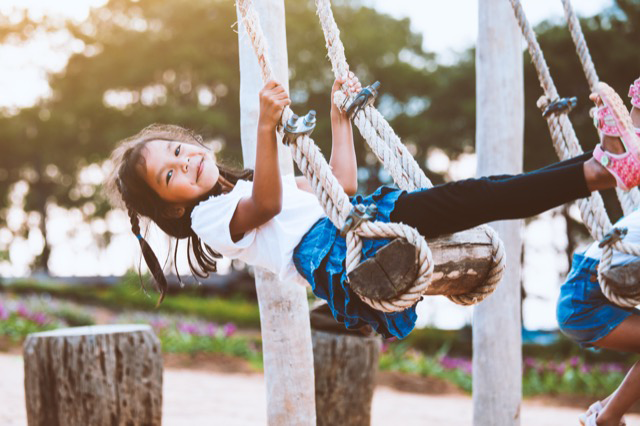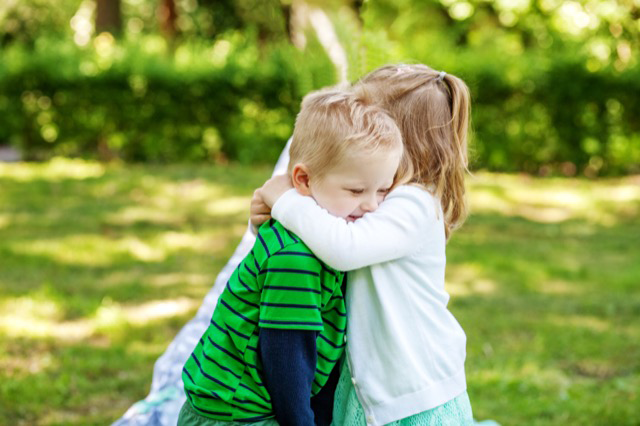人際/社會互動技巧
課程目標
透過團體課程,提升孩子的社交技巧、互動能力、問題解決能力,培養孩子的自信心、同理心、挫折忍受度、情緒調節能力,讓孩子從小團體(2~6人)的練習中,逐漸具備發展良好人際關係的能力。
課程詳細說明
影響孩子社交技巧、互動能力,及社會情緒表現的因素有很多,以下列舉的狀況皆可能造成孩子的社交技巧、互動能力或社會情緒表現不佳,包括:
- 感覺調節障礙,例如:觸覺防禦、重力不安全感、聽覺防禦、感覺尋求等,感覺調節問題會影響孩子解讀環境中訊息的能力,通常有感覺防禦的孩子會比較敏感、容易緊張焦慮,因而在社交情境下顯得較退縮或躁動不安。
- 警醒度調節不佳,孩子警醒度偏高時,常會隨著環境變化而過度興奮或過度緊張,導致在社交情境中控制不了自己的行為,或是太緊張而表現退縮;孩子警醒度偏低時,則常會發呆恍神,或沉浸在自己的世界裡,無法良好的參與社交情境,不論是警醒度偏高、偏低或是波動,都會讓孩子無法有適當的社交表現。
- 情緒調節不佳,例如:和同儕玩遊戲時,容易生氣、和別人吵架等。
- 衝動控制不佳,例如:搶玩具、不能排隊等待、搶著說話等。
- 挫折忍受度低,例如:玩遊戲不能輸、輸了就拒絕再和對方一起玩等。
- 堅持度高、固執、缺乏彈性思考,例如:無法和同儕討論遊戲規則、堅持己見等。
- 問題解決能力不佳,例如:和同儕意見不同時會不知所措,或使用不適當的方式(如:大吼大叫、態度不佳)溝通等。
- 缺乏同理心,例如:遊戲贏了就嘲笑輸的一方、說別人很笨等。
- 缺乏與同儕的(正向)互動經驗,例如:沒有固定玩伴的獨生子女。
- 理解能力或表達能力落後同儕,可能造成孩子與同儕遊戲時,因不理解遊戲規則或無法好好表達自己的想法,而與同儕有衝突,或是同儕不想一起玩。
- 缺乏社會認知(social thinking)能力,例如:不為別人著想、不會從別人的角度來看事情、對社會潛規則的認知不足。
職能治療師會在個別課時,首先評估及處理孩子的個別狀況,當孩子狀況逐漸進步及穩定後,若有社交技巧訓練需求的孩子,該名治療師將會與其他治療師討論是否有適合一起上團體課的孩子,並組成2~6人小團體的形式來練習人際互動,以提升孩子的社交技巧、互動能力、問題解決能力,也從中培養孩子的自信心、同理心、挫折忍受度、及情緒調節能力,讓孩子逐漸具備發展良好人際關係的能力。
案例分享
感統失調的小貞

小貞小班升中班時因為換幼兒園時發現無法融入團體生活,跟一些家長團體聊到孩子狀況時,有些朋友推斷孩子應該有 感統失調 的觸覺防禦,剛開始覺得有些遲疑,且從幼兒園老師說明女兒的狀況,感覺好像將時光拉回到我小時候,因為這些狀況我小時候都有,但我也就這樣長大了,因此剛開始並沒有太在意。
由於我本身是外科醫生工作忙且時間不固定,因此無法協助常常一打二的太太,再加上後來想想人生過程其實有很多碰壁的時候,很怕孩子不如自己幸運、順遂,想在自己有能力時能全力幫助孩子。
在朋友的推薦下來啟端,吳老師諮詢時每一項都切重要害,像是孩子有重力不安全感讓他無法參與任何有高度的遊戲,因為觸覺防禦因此在人際互動上也困難重重,也告訴我「運動」對於幫助孩子的重要性,這些我到現在都還記憶猶新。
在啟端的改變
為了幫助女兒,我辭去原本忙碌的工作轉到時間較彈性的醫院,每周都會陪著女兒一起到啟端上課,上到第6個月時,幼兒園老師說女兒比較能融入團體,也開始願意嘗試新事物,其實我自己也有發現,因為原本怕高的她,居然敢攀爬、盪鞦韆了。此外為了讓他有更多運動的機會,周末我跟太太都會帶她去戶外,看到吊橋時我以為她會跟以前一樣退縮,但卻主動說要試試看,這真的讓我出乎意料。
讓我更驚艷的是,陳老師為了幫助小貞人際、社交,因此安排團體合課,當我看到合課的是兩位小男生時,就在想小貞可能沒辦法,上課5分鐘後我就更篤定,因為兩位小男生是小貞最害怕的類型,就是比較熱情帶點侵略的個性,但結果卻讓我意想不到;陳老師用運動帶入人際關係,引導小貞喜歡不喜歡應該怎麼做、如何跟他人互動,女兒從有點抗拒到慢慢可以融入,後來慢慢可以跟同學合作,這對我跟太太來說是最棒的禮物。
有時候是藉由小孩再次認識自己,回想到我以前也蠻常是一個人的,後來有段時間常常運動,現在回想起來自發運動幫助了自己,也讓社交圈慢慢打開,而這些隨著我愈來愈好已經封存的記憶,因為女兒的狀況,過往畫面一幕幕在腦中播放著。很感謝朋友的提點、很慶幸在這一年認識啟端、認識陳老師,讓我在女兒小時候就能從旁協助,做女兒最強的後盾。
觸覺敏感的小希

小希出生在美國疫情爆發的開始,從出院到兩歲多回台上學這段期間,幾乎24小時都與父母在一起,一歲開始去公園玩時,在遊樂設施上,只要有其他孩子靠近,小希會盡力地靠邊讓其他孩子先走,與父母的朋友聚餐,也需要「歡」上一些時間才能入座,回台灣上學的剛開始,小希花了足足一個月的時間觀察整個教室,不參與工作,團體時間雖然會跟著跳舞、跟著回答老師,但堅持處在教室的另一端,幸運的是她有個好老師,陪著父母一起等待她願意的時間。
漸漸習慣學校後的她,開始願意工作,坐在團體裡,以為一切開始變好時,小希開始有了攻擊的行為,在家從不體罰的我們對她會有這樣的行為百思不得其解,不斷地檢討自己,是不是對待她的方式哪裡需要調整,要怎麼教導她不能動手。在學校是經由老師的調整,幾次後再也沒有發生,但放學到了公園,手總是往經過他身邊的人揮,一出門就是奔跑不停,就連別人看她都會引發她的情緒起伏,進入到了與家人或父母朋友的聚會,卻只想躲在父母的懷裡。近半年裡,只要帶他出門,體力與精神上總充滿挑戰與壓力,感到疲憊無比而決定尋找專業來幫忙。
第一次到啟端諮詢時,才認識到了 高敏 兒有不同類型的區分,也終於找到孩子行為背後的原因,更得到了明確可以改變的指引,等待啟端安排上課的同時,帶小希上了許多其他的運動課,在啟端一對一上課後的一個月,開始有了明顯的變化,出門手揮舞的頻率下降,在學校裡的遊戲時間不再是想要找最沒有人的角落玩,跟同學間的碰觸接受度大大提升,第一次的課程還沒結束前,她已經開始學習努力交朋友,邀請朋友到家裡,在玩樂上的碰觸,雖然感到不適,但來找父母揉一揉即可立即調適好。每一次的上課,老師都有明確的告訴我們,這堂課是在給予她哪方面的幫助與調整,每一週雖然會有起伏,但都會明顯感受到是往正面發展。在上課中,老師有了解到小希不只身體敏感,個性上也非常有主見,在日常常規上或是團體生活裡,處處都挑戰她,也挑戰大人,因此第二階段的課程幫助小希聽從指令及情緒調節上著手,也都有很明顯的改變,老師教導爸媽如何回應、引導及處理孩子情緒的方法,是實際且實用。
小希現在在學校交了很要好的朋友,也不時的邀請朋友來家裡或到朋友家玩,不論是見到父母的朋友或是同學的家長,都可以熱情的打招呼,面對到陌生人已經可以以禮貌性的稍作回應,更讓父母感動的是看到他在與朋友玩樂時有了爭執,才三歲半的她可以忍著情緒對著朋友說:「我們來討論、討論。」這就是陳老師教導我們父母如何跟小希相處時的方法,小希也完全學習並運用在跟朋友相處上。
陪伴與教育孩子是一生的事,每個階段有不同的難關要過,由衷感謝啟端的陳老師,專業及耐心陪伴著爸媽,溫柔的引導小希,在小希開始學習社交時,能夠及時給予有效幫助,也讓父母更認識自己的孩子,能夠儘早調整,讓孩子在未來與人相處上,有著正面積極的應對。